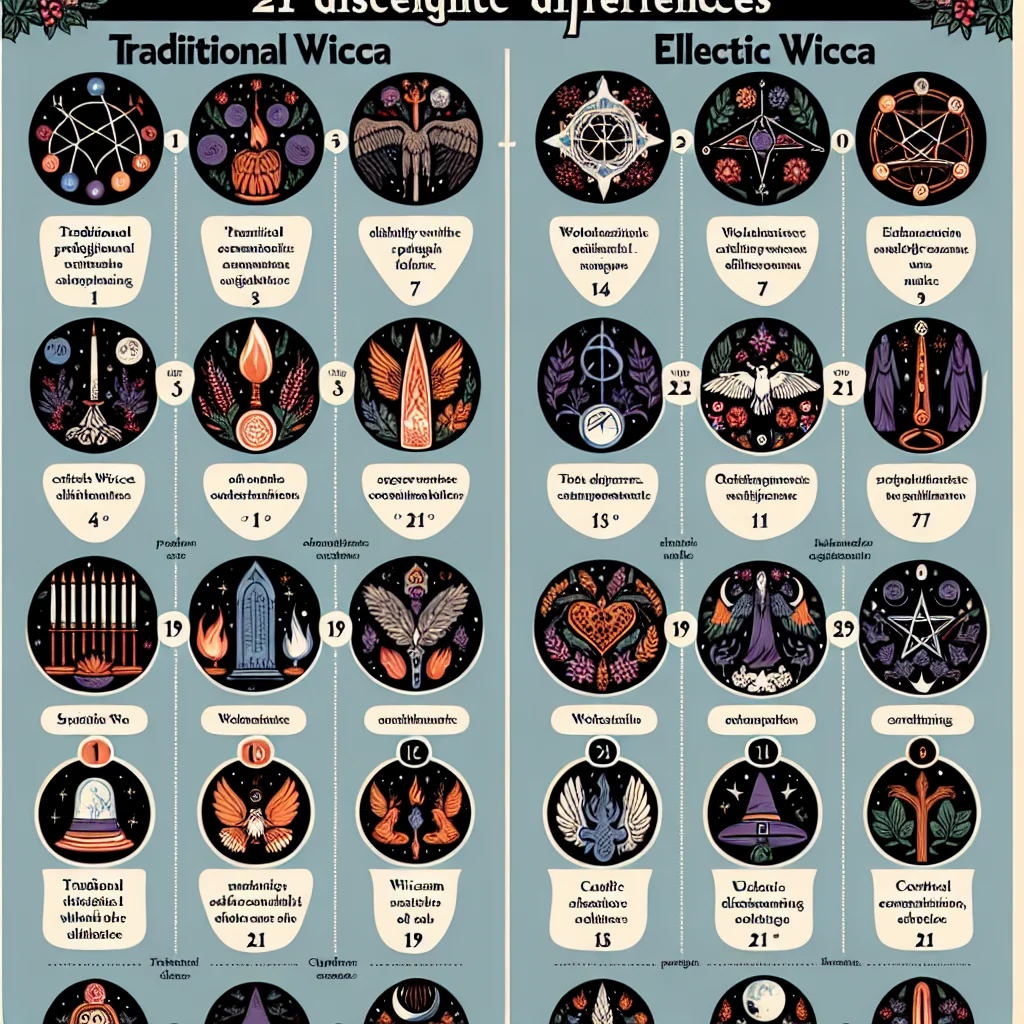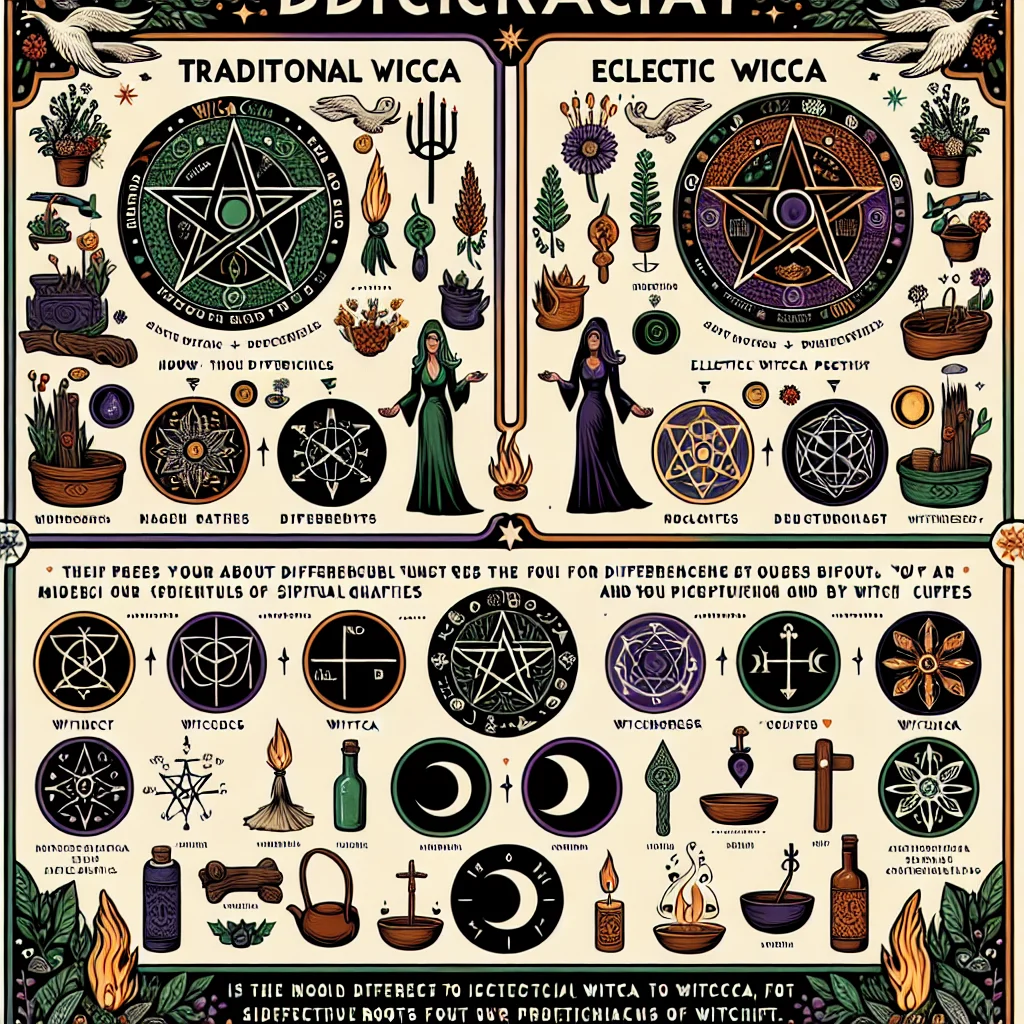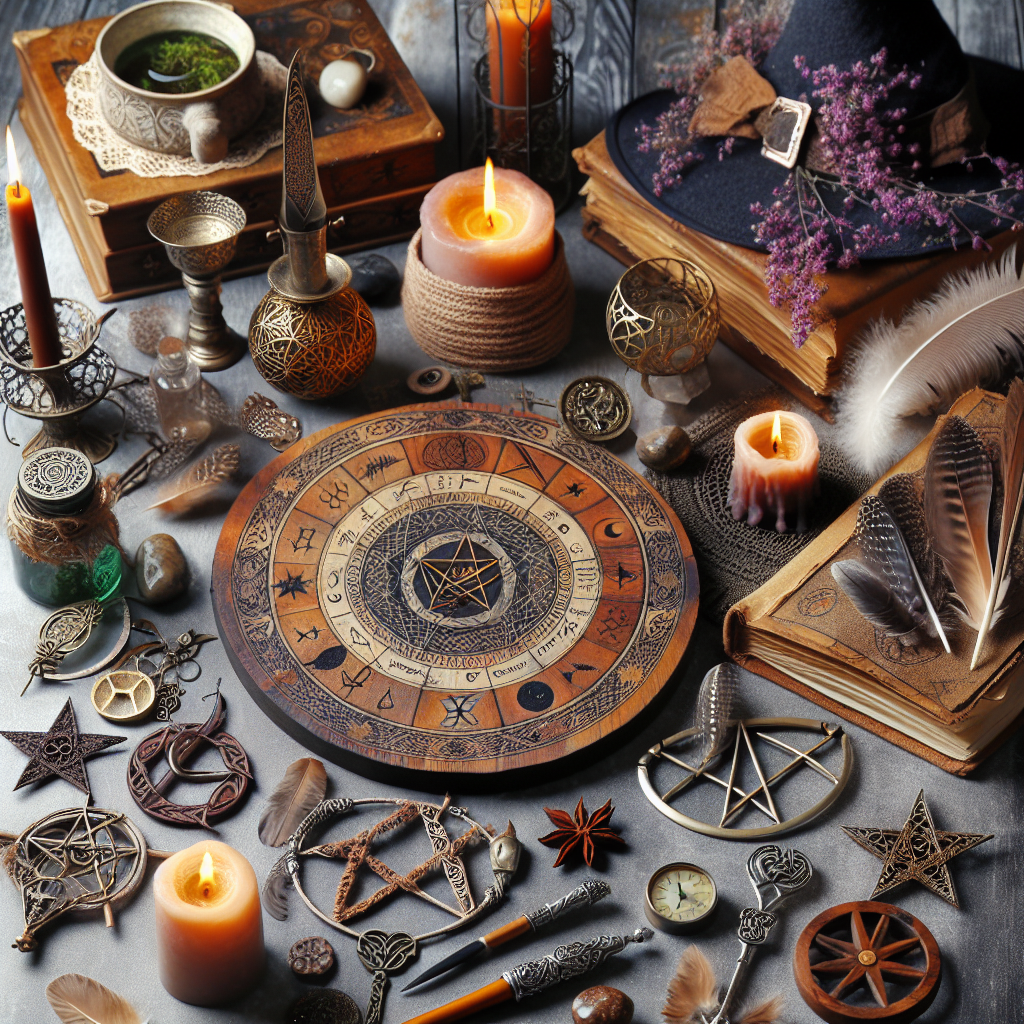As an Amazon Associate I earn from qualifying purchases.

Introduction to Wicca
Traditional Wicca and Eclectic Wicca represent two distinct paths within the modern Pagan religious movement. According to a 2014 Pew Research Center study, approximately 0.4% of American adults identify as Wiccan or Pagan. Both subcategories of Wicca have gained significant followings, each offering unique practices and principles.
Historical Roots and Evolution
Traditional Wicca, often tracing its origins to Gerald Gardner in the mid-20th century, emphasizes adherence to established rituals and coven structures. Gardnerian and Alexandrian Wicca are two primary forms of Traditional Wicca, both requiring formal initiation and maintaining a lineage from priestess to priestess. In contrast, Eclectic Wicca emerged more recently, offering practitioners the flexibility to incorporate elements from various spiritual paths, including different Pagan traditions, Eastern religions, and modern New Age practices.
Ritual Practices
Traditional Wicca typically adheres to a structured format for rituals, often involving a set sequence of invocations, tools, and ceremonial garb. Initiates usually participate in rituals celebrating the Wheel of the Year and esbats, aligning their practice with solstices, equinoxes, and full moons. Eclectic Wicca allows for more personalized rituals, which may vary significantly from practitioner to practitioner. This adaptability often includes creating unique spells, mixing pantheons, and holding ceremonies that resonate personally with the individual or group.
Core Beliefs and Theological Flexibility
Traditional Wicca places a strong emphasis on the worship of a God and Goddess, often symbolizing natural forces and represented through various cultural deities. This duality reflects in many Wiccan practices and teachings, underlining the balance between masculine and feminine energies. Eclectic Wicca, on the other hand, offers greater theological flexibility, allowing practitioners to draw from a wide array of deities and spiritual archetypes. This inclusiveness provides a way for individuals to tailor their spiritual beliefs to align with their personal experiences and evolving understanding.
Initiation and Membership
Traditional Wicca generally requires formal initiation into a coven, often governed by hierarchical degrees of advancement. This initiation process not only serves as a rite of passage but also as a means of preserving the lineage and teachings of the tradition. Eclectic Wicca does not mandate formal initiations and is more open to solitary practice or ad-hoc group formations. Individuals can self-dedicate and start practicing without the need for formal acceptance or recognition by established members.
Community and Accessibility
Traditional Wicca’s emphasis on coven-based structure can sometimes limit access for those not in proximity to an established coven or those uncomfortable with hierarchical systems. This exclusivity can be a barrier to entry for many seekers. Eclectic Wicca provides a more accessible path, often facilitated through online communities, public gatherings, and solitary practice. This inclusivity makes it easier for people from diverse backgrounds to find a place within the Wiccan fold.
Adherence to Tradition Versus Innovation
Traditional Wicca values the retention and transmission of established rituals and practices, viewing them as essential to maintaining the integrity and authenticity of the tradition. This respect for historical continuity can sometimes clash with the innovative spirit found in Eclectic Wicca, which encourages experimentation and the integration of new ideas. This openness to innovation within Eclectic Wicca allows for a dynamic and evolving practice, responsive to contemporary spiritual needs and understandings.
Traditional Wicca, often rooted in the practices developed by Gerald Gardner in the 1950s, follows specific lineages, coven structures, and rituals. Eclectic Wicca, on the other hand, is a more personalized and varied approach to the spiritual and magical practices of Wicca. Below, we’ll explore 21 key differences between these two paths within the broader umbrella of modern Wicca.
1. **Origin and Lineage**: Traditional Wicca places importance on unbroken lines of initiation leading back to one of the original forms like Gardnerian or Alexandrian Wicca. Eclectic Wicca does not emphasize lineage and often incorporates diverse influences.
2. **Coven Structure**: Traditional Wicca generally operates in a coven-based structure with a strict hierarchy. Eclectic Wicca practitioners may work in covens, solitary, or in loosely organized groups with a more fluid hierarchy.
3. **Ritual Format**: Rituals in Traditional Wicca follow specific, historical formats passed down through initiations. In Eclectic Wicca, rituals are often created by individuals or groups, adapting practices from various spiritual traditions.
4. **Tools and Symbols**: In Traditional Wicca, specific ritual tools and symbols have historical and traditional significance. Eclectic Wicca may use similar tools but is more likely to adapt or create new ones to suit individual preferences.
5. **Training and Initiation**: Traditional Wicca requires formal initiation and often involves extensive training. Eclectic Wicca may or may not require initiation, and training can be informal, self-directed, or non-existent.
6. **Deity Worship**: Traditional Wicca typically involves worship of the God and Goddess as represented in Wiccan tradition, often drawing from British deities. Eclectic Wicca practitioners may worship a wide variety of deities from different pantheons, or none at all.
7. **Festivals**: Both paths observe the Wheel of the Year, but Traditional Wicca adheres to set rituals for these festivals. Eclectic Wiccans may adapt or combine festivals from various traditions.
8. **Textual Resources**: Traditional Wiccans may refer to the Book of Shadows specific to their lineage. Eclectic Wiccans often compile their own Books of Shadows, drawing from a variety of sources.
9. **Focus of Practice**: Traditional Wicca can have a strong focus on coven dynamics and the lineage’s continuity. Eclectic Wicca tends to focus more on personal spiritual development and experimentation.
10. **Initiatory Secrets**: Traditional Wicca maintains specific degrees of initiation with secret knowledge revealed progressively. Eclectic Wicca typically has more open practices without such secrecy.
11. **Ethics and Morality**: Traditional Wicca often adheres closely to the Wiccan Rede and other traditional ethical guidelines. Eclectic Wiccans may blend the Wiccan Rede with ethical systems from other spiritualities.
12. **Magic Practice**: The magical practices of Traditional Wicca draw heavily from ceremonial magic and Western Esoteric traditions. Eclectic Wicca might incorporate practices from shamanism, New Age thought, and other magical traditions.
13. **Cultural Influence**: Traditional Wicca primarily stems from British cultural and magical traditions. Eclectic Wicca is influenced by global spiritual and magical practices, acknowledging diverse cultural contributions.
14. **Community and Networking**: Traditional Wicca often connects through established coven networks and events. Eclectic Wicca uses a wide range of modern options including online forums and social media to build community.
15. **Personal Interpretation**: In Traditional Wicca, personal interpretations of rituals and beliefs are generally guided by the coven’s teachings. Eclectic Wicca allows for a great deal of personal interpretation and adaptation.
16. **Ecclesiastical Garb**: Traditional Wiccans may wear robes or specific regalia during rituals. Eclectic Wiccans often dress in whatever they feel is appropriate for their personal practice.
17. **Historical Fidelity**: Traditional Wicca strives to maintain fidelity to its roots and historical practices. Eclectic Wicca is more flexible, often integrating contemporary and multicultural influences.
18. **Sacred Space**: Traditional Wiccans often practice in consecrated circles formed through well-established rituals. Eclectic Wiccans might create sacred space using various diverse methods that resonate personally.
19. **Divinatory Systems**: Traditional Wicca might emphasize specific forms of divination such as tarot or runes. Eclectic Wicca is open to adopting any divinatory practices that appeal to the practitioner.
20. **Gender Roles**: Traditional Wiccan covens often reflect specific gender roles, pairing male and female energies. Eclectic Wicca is typically more inclusive, often welcoming all gender identities and expressions.
21. **Public Perception**: Traditional Wicca has sometimes been perceived as more ‘legitimate’ due to its structured nature and historical roots. Eclectic Wicca is seen as more innovative and inclusive, reflecting broader societal trends.
In modern Wicca, these differences between traditional and eclectic paths demonstrate the diversity within the Wiccan community. A recent survey indicated that approximately 60% of Wiccans in the United States identify as eclectic, showcasing a trend toward personalized, inclusive practices in witchcraft.
Ritual Practices
When I started practicing Traditional Wicca, I noticed the rituals were highly structured. Each ceremony followed a strict set of guidelines, which in a way felt comforting because I knew exactly what to expect. The rituals often involved specific invocations, tools, and even clothing. For example, we would always use a particular athame and wear specific garb for Esbats and Sabbats.
In contrast, when I began to explore Eclectic Wicca, the first thing that struck me was the freedom in ritual practices. Instead of adhering to a pre-set structure, I could incorporate elements that resonated more personally with me. Sometimes, our group would even create hybrid rituals that combined Wiccan elements with practices from other pagan traditions or spiritual paths. The flexibility felt liberating and allowed for more personal expression.
One time, we had a ritual where we included aspects of both Wiccan and Druid practices. We crafted a circle and called the quarters in the Wiccan tradition but then performed a tree meditation from the Druid tradition. The amalgamation of rituals from different paths turned out to be deeply moving and personal for everyone involved, showcasing the adaptable nature of Eclectic Wicca.
Deity Focus
In my experience with Traditional Wicca, our focus was often on the duality of the God and the Goddess. These deities were not just metaphors but held significant importance in guiding our moral and spiritual compass. We would frequently dedicate entire rituals to honor them, especially during Sabbats like Beltane and Samhain.
On the flip side, practicing Eclectic Wicca allowed me to explore a broader range of deities beyond the traditional Wiccan God and Goddess. I recall one summer solstice where we honored solar deities from various cultures, including Ra from Egyptian mythology and Helios from Greek mythology. The experience was enlightening and fostered a sense of global spiritual unity.
I remember feeling less confined and more exploratory in my path when honoring these diverse deities. It provided a way to connect with different cultural elements and spiritual archetypes, enriching my personal practice. This flexibility enabled me to tap into a more expansive spiritual well, drawing from different mythological sources.
Community Dynamics
Being part of a Traditional Wicca coven meant that there was a strong sense of community and kinship. We functioned as a close-knit family, often with a hierarchical structure that dictated roles and responsibilities. This framework provided a stable environment where practices were consistent, and members knew their roles well.
When I transitioned to an Eclectic Wicca community, the dynamic felt noticeably different. The groups I joined were often less hierarchical and more egalitarian. This openness allowed for greater input from all members, making everyone feel valued and heard. I remember one group meeting where we decided as a collective on the themes and focuses for our upcoming rituals, making it a collaborative effort rather than top-down.
This shift from a closed, hierarchical system to a more open and inclusive one provided me with an opportunity to express my own spirituality more freely. I felt a stronger sense of ownership in the rituals and practices, which deepened my overall engagement and commitment to the path.
Learning and Mentorship
Starting out in Traditional Wicca, the learning process was formal and structured. I entered as a novice, mentored by a High Priestess who guided me through each degree of initiation. This system ensured that I received thorough training and a deep understanding of Wiccan laws, ethics, and practices. The mentorship was invaluable and gave me a solid foundation.
On the contrary, my experience with Eclectic Wicca was more self-directed and less formal. I found myself learning through a mix of personal study, workshops, and informal mentorships. During one of our gatherings, I met a Shaman who introduced me to healing rituals that dovetailed beautifully with Wiccan practices. This ad-hoc mentorship provided a rich, albeit less consistent, learning experience.
The flexibility of learning in Eclectic Wicca allowed me to explore niches that Traditional Wicca didn’t cover. It was less about following a prescribed curriculum and more about following one’s intuition and interests. This approach offered a sense of personal discovery and autonomy, but also required a higher degree of self-motivation and responsibility.
u003ch2u003e1. What is Traditional Wicca?u003c/h2u003e
u003cpu003eTraditional Wicca refers to a form of Wicca that closely adheres to established practices, rituals, and coven structures set by early Wiccan founders, such as Gerald Gardner and Doreen Valiente. It often involves lineages and initiations.u003c/pu003e
u003ch2u003e2. How does Eclectic Wicca differ from Traditional Wicca?u003c/h2u003e
u003cpu003eEclectic Wicca is more flexible and personalized, allowing practitioners to draw from multiple spiritual traditions and tailor their practices to their individual needs, rather than strictly adhering to a set tradition.u003c/pu003e
u003ch2u003e3. Are initiations required in both Traditional and Eclectic Wicca?u003c/h2u003e
u003cpu003eInitiations are a critical component of Traditional Wicca, symbolizing entry into a lineage. Eclectic Wicca, on the other hand, does not necessarily require formal initiations and might involve self-dedication rituals.u003c/pu003e
u003ch2u003e4. Can Eclectic Wiccans join covens?u003c/h2u003e
u003cpu003eYes, Eclectic Wiccans can join covens, but these covens are usually more flexible and inclusive compared to the structured covens in Traditional Wicca. Some might even form their own eclectic covens.u003c/pu003e
u003ch2u003e5. What are the ritual differences between Traditional and Eclectic Wicca?u003c/h2u003e
u003cpu003eTraditional Wicca rituals follow a set structure with specific liturgy, tools, and deities. Eclectic Wicca rituals can be more innovative and varied, incorporating elements from various spiritual paths and personal preferences.u003c/pu003e
u003ch2u003e6. Are there specific deities worshipped in Traditional and Eclectic Wicca?u003c/h2u003e
u003cpu003eTraditional Wicca often focuses on deities from specific pantheons, like the God and Goddess as envisioned by Gardner. Eclectic Wicca may involve worship of deities from various cultures and traditions, chosen by the practitioner.u003c/pu003e
u003ch2u003e7. How does the concept of lineage affect Traditional Wicca?u003c/h2u003e
u003cpu003eLineage in Traditional Wicca is a significant aspect, relating to the history and authenticity of one’s training and initiation. It’s a way to trace one’s teachings back to the original founders.u003c/pu003e
u003ch2u003e8. Is Eclectic Wicca considered less valid than Traditional Wicca?u003c/h2u003e
u003cpu003eNo, Eclectic Wicca is not considered less valid. Both paths are respected within the Wiccan community, though practitioners may have varying opinions. The key is the intention and sincerity of the practice.u003c/pu003e
u003ch2u003e9. Can someone transition from Eclectic Wicca to Traditional Wicca?u003c/h2u003e
u003cpu003eYes, someone can transition from Eclectic Wicca to Traditional Wicca, but they would typically need to undergo formal training and initiation within a Traditional Wiccan coven.u003c/pu003e
u003ch2u003e10. What are common misconceptions about Eclectic Wicca?u003c/h2u003e
u003cpu003eCommon misconceptions about Eclectic Wicca include the idea that it lacks structure or seriousness. In reality, many eclectic practitioners are deeply dedicated to their spiritual paths and create robust, meaningful practices.u003c/pu003e

## Conclusion
Both Traditional Wicca and Eclectic Wicca offer unique pathways that cater to different spiritual needs and preferences. Traditional Wicca is often rooted in established lineages and covens, focusing on a strict adherence to rituals, hierarchies, and initiatory practices that preserve the original tenets of the Wiccan faith. It emphasizes discipline, consistency, and a deep connection to historical practices. Eclectic Wicca, on the other hand, offers a more personalized and flexible approach, allowing practitioners to draw from various spiritual traditions and create individualized rituals. This path is particularly appealing to those who seek a more individualized and adaptable spiritual journey, free from the constraints of rigid tradition.
The differences between Traditional and Eclectic Wicca highlight the broader spectrum of Wiccan paths and modern witchcraft practices. Traditional Wicca, with its firm guidelines, offers a structured spiritual development, cultivating a sense of belonging within a cohesive community. Conversely, Eclectic Wicca celebrates diversity and innovation, encouraging practitioners to explore multiple spiritual dimensions and craft a practice that resonates personally. These distinctions underscore the dynamic and evolving nature of modern Wicca, reflecting its capacity to honor ancient traditions while embracing contemporary spiritual needs. Both paths enhance the richness of the Wiccan community, providing varied avenues for spiritual growth and personal fulfillment.
Amazon and the Amazon logo are trademarks of Amazon.com, Inc, or its affiliates.


